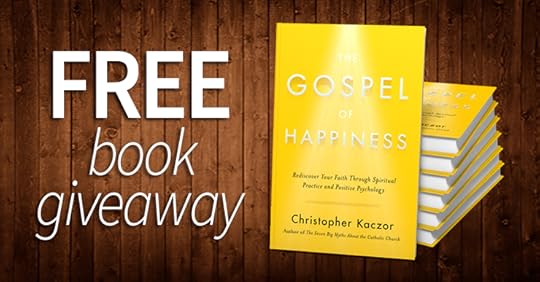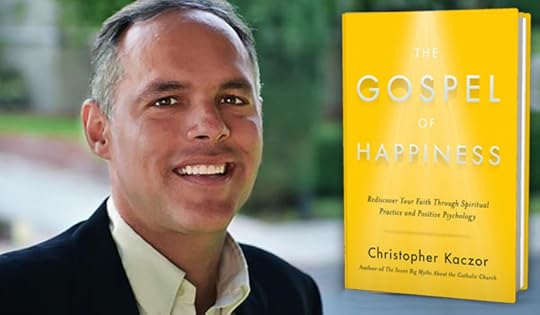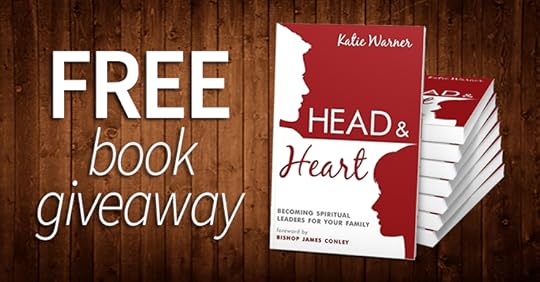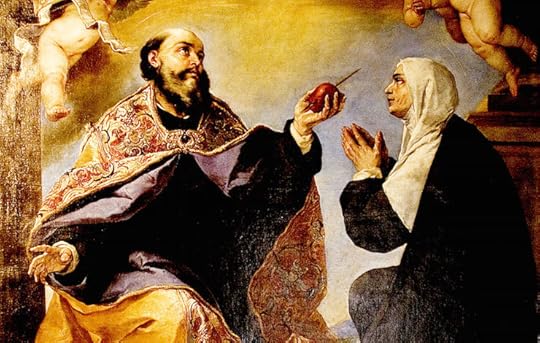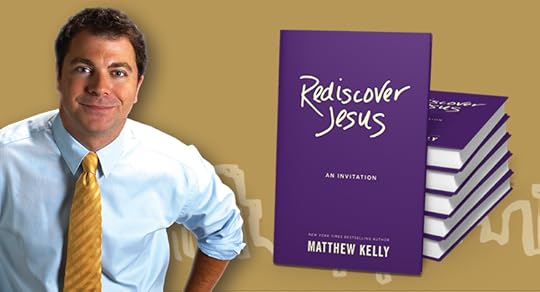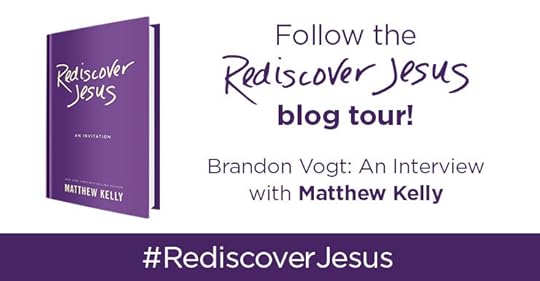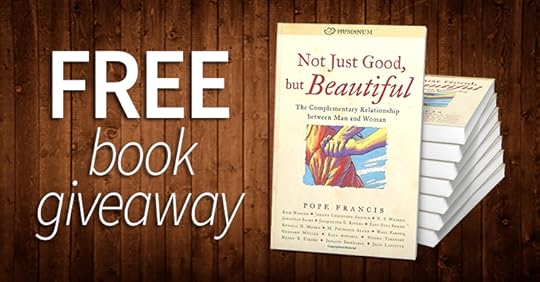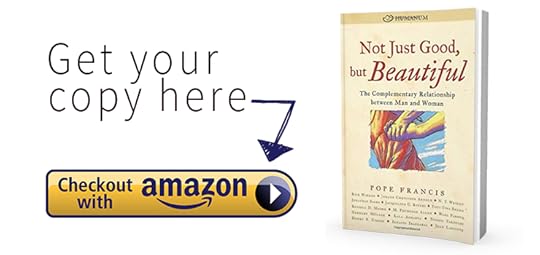Brandon Vogt's Blog, page 14
September 18, 2015
Book Giveaway (10 copies): “The Gospel of Happiness”
“Find out how much God has given you and from it take what you need; the remainder is needed by others.” – St. Augustine
Since I’ve built up a large collection of extra books and resources, every week I give some away absolutely free, no strings attached. Each giveaway lasts seven days with a new one beginning every Friday. You can enter any time during the week. Check out my past giveaways here.
Thanks to Image Books, today I’m giving away TEN copies of Christopher Kaczor’s new book, The Gospel of Happiness. Learn more and enter below!
The Gospel of Happiness: Rediscover Your Faith Through Spiritual Practice and Positive Psychology
by Christopher Kaczor
Image Books, 208 pages, hardcover
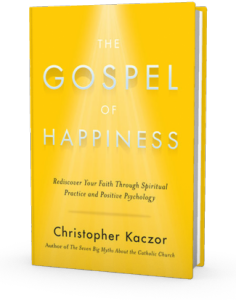 What is true happiness? How can you experience it? And can you live it wholeheartedly in your day-to-day life? Every thoughtful person asks such questions. Thoughtful Christians ask a few more questions such as, Can Christian practices enhance happiness? If so, how? And does Christianity provide happiness in a way that other paths, like psychology, cannot?
What is true happiness? How can you experience it? And can you live it wholeheartedly in your day-to-day life? Every thoughtful person asks such questions. Thoughtful Christians ask a few more questions such as, Can Christian practices enhance happiness? If so, how? And does Christianity provide happiness in a way that other paths, like psychology, cannot?
Christopher Kaczor suggests answers to these and other questions about how to be happier. In The Gospel of Happiness, the bestselling author of The Seven Big Myths of the Catholic Church highlights seven ways in which positive psychology and Christian practice can lead to personal and spiritual transformation. Focusing on empirical findings in positive psychology that point to the wisdom of many Christian practices and teachings, the author provides not only practical suggestions on how to become happier in everyday life but provides insight on how to deepen Christian practice and increase love of God and neighbor in new and bold ways.
“Part of the Christian message is that authentic happiness is to be found not in selfishness, but self-giving,” writes Dr. Kaczor. “In this book, I highlight the many ways in which positive psychology and Christian practice overlap. All of this points us toward deeper fulfillment in this life, and in the life to come.”
I’m using Gleam to help with the giveaway, which is cool because it allows you multiple entries for posting on Facebook, sharing on Twitter, etc. Click below to enter:
(If you’re reading this through email or RSS and don’t see the giveaway widget, click here.)
By entering this giveaway you agree to occasionally receive email updates from me—no spam, just updates about free books, cool links, and exciting news.
The winner(s) will be randomly selected next Friday and the books will be sent out, free of charge, shortly thereafter.
In the future I’ll be giving away more books and resources, sometimes multiple items per giveaway! So subscribe via feed reader or email to ensure you never miss your chance to win.
(Since I’m covering the shipping costs, only residents within the continental United States are eligible to win.)
The post Book Giveaway (10 copies): “The Gospel of Happiness” appeared first on Brandon Vogt.





September 15, 2015
The Gospel of Happiness: An Interview with Dr. Christopher Kaczor
What is true happiness? How can you experience it? And can you live it wholeheartedly in your day-to-day life? Every thoughtful person asks such questions. Thoughtful Christians ask a few more questions such as, Can Christian practices enhance happiness? If so, how? And does Christianity provide happiness in a way that other paths, like psychology, cannot?
Dr. Christopher Kaczor answers those questions and more in his new book, The Gospel of Happiness: Rediscover Your Faith Through Spiritual Practice and Positive Psychology (Image, 2015).
Below you’ll find an interview with Dr. Kaczor about the ideas in his book. Enjoy!
BRANDON VOGT: Why did you write The Gospel of Happiness?
DR. CHRISTOPHER KACZOR: This book arose through personal experience. After a serious set-back, I had a few years of feeling very unhappy and searching for something that could remedy the blues. In looking into becoming happier myself, I discovered “positive psychology,” a branch of psychology focusing on optimism, well-being, and flourishing. I had previously read both philosophical and theological treatments of happiness, but this psychology approach was new to me. As I read I was amazed at the overlap between what positive psychologists found and the teachings of Christian spiritual guides, such as the founder of the Jesuits St. Ignatius Loyola.
BRANDON VOGT: Early in the book you mention that your only personal experience in psychological counseling had not been positive and that you had always viewed psychology as an alternative to religion. Can you tell us a little bit about how your thoughts on the matter changed when you discovered “positive psychology”?
 DR. CHRISTOPHER KACZOR: In my mind, I thought of psychology and spirituality as two alternative ways to pursue happiness. What I discovered was that these two approaches are often complementary, and in deed can be mutually reinforcing. Positive psychology provides empirical confirmation of the happiness producing effects of Christian practices, such as serving others, giving thanks, and forgiving others. Moreover, psychology also indicates ways to enhance Christian spiritual practices. At the same time, Christian wisdom enhances and deepens recommendations found in positive psychology. So, rather than think it is either psychology or spirituality, ideally it can be both psychology and spirituality.
DR. CHRISTOPHER KACZOR: In my mind, I thought of psychology and spirituality as two alternative ways to pursue happiness. What I discovered was that these two approaches are often complementary, and in deed can be mutually reinforcing. Positive psychology provides empirical confirmation of the happiness producing effects of Christian practices, such as serving others, giving thanks, and forgiving others. Moreover, psychology also indicates ways to enhance Christian spiritual practices. At the same time, Christian wisdom enhances and deepens recommendations found in positive psychology. So, rather than think it is either psychology or spirituality, ideally it can be both psychology and spirituality.
BRANDON VOGT: For the purpose of this book, how do you define happiness? How do you measure it?
DR. CHRISTOPHER KACZOR: In this work, I think about happiness in terms of positive emotion, engagement, relationships, meaning, and achievement (PERMA, as Martin Seligman calls it). Part of happiness is positive emotion, such as joy, optimism, and excitement. But happiness is more than just ‘feeling good.’ It also includes engagement with the flow of life when we are so caught up in our hobbies, work or activity that an hour or two feels like ten minutes. At the heart of happiness is good relationships with people. The findings of positive psychology reinforce the ancient teachings of Aristotle that no one can be happy without friends. Likewise, happiness requires meaning which is making a positive difference beyond the self such as to family, church, community, neighborhood, or school. The final aspect of happiness is seeking achievement of various goals-personal, social, spiritual, and professional.
BRANDON VOGT: In The Gospel of Happiness, you highlight the many ways in which positive psychology and Christian practice overlap. You offer helpful suggestions on how to become happier in everyday life and how to deepen Christian practice based on contemporary psychological insights. Do you have a favorite activity that combines positive psychology and Christian practice?
DR. CHRISTOPHER KACZOR: The very first practice I learned from positive psychology is called the “Three Blessings Exercise.” At the end of the day, simply think over how the day went looking for whatever went well—a tasty nectarine at lunch, a funny conversation with a neighbor, a task finally off the “to do” list, or a moment of relaxation with hot coffee. Once you’ve come up with three things, you write down what happened and why it happened. Research indicated that “Three Blessings Exercise” reduces depression and helps increase happiness by making us more aware of the good things that are already in our lives to which we may have not paid much attention. Centuries ago in his Spiritual Exercises, St. Ignatius Loyola recommended something like “Three Blessing Exercise” in what is called the Examin. When we look for what is good we are more likely to find and celebrate what is good. When we thank God for the joys we find in life, our gratitude is enhanced.
BRANDON VOGT: What do you hope folks will gain from reading The Gospel of Happiness?
DR. CHRISTOPHER KACZOR: First, I hope readers become happier! We all want happiness, and The Gospel of Happiness provides empirical evidence for what does and does not deliver on the promise of human flourishing. I also hope readers find an encouragement for faith. I found much evidence in psychology for the wisdom of the teachings of Jesus encouraging forgiveness, service, prayer, gratitude, and hope. Thirdly, I hope that people find practical suggestions for doing what can be challenging, such as forgiving others and doing the right but more difficult thing in the face of temptation. Finally, I hope that readers can see the beautiful harmony that can exist between faith and reason, between spirituality and psychology. We can learn much from the rich interaction between them.
BRANDON VOGT: One of the most interesting parts of the book is the final chapter about weakness of will. Can you talk about that?
DR. CHRISTOPHER KACZOR: Good people want to do the right thing, but sometimes they actually do what is bad. St. Paul said, “I do not understand what I do. For what I want to do, I do not do, but what I hate, I do.” Oscar Wilde echoed the sentiment, “I can resist anything but temptation.” Fortunately, contemporary psychologists offer ways to strengthen willpower. These discoveries—many of which were discovered centuries earlier by saints—can help people live the message of Jesus more consistently.
The post The Gospel of Happiness: An Interview with Dr. Christopher Kaczor appeared first on Brandon Vogt.





September 11, 2015
Learning from a Model of Evangelistic Zeal
Today we continue our regular series called “Learning from the Saints.” Our guide is expert Bert Ghezzi, a dear friend of mine and the author of numerous books including Voices of the Saints, Saints at Heart, and Discover Christ: Developing a Personal Relationship with Jesus.
His more recent books are The Power of Daily Mass and The Heart of Catholicism. You can learn more about Bert and his work at BertGhezzi.com.
Today, Bert profiles St. John Gabriel Perboyre, a French priest and martyr who was canonized by St. John Paul II in 1996.
“O my Divine Savior,
transform me into yourself,
May my hands be the hands of Jesus.
May my tongue be the tongue of Jesus.
Grant that every faculty of my body
may serve only to glorify you.
Above all transform my soul and all its powers
that my memory, my will and my affections
may be the memory, the will and the affections of Jesus.
I pray you to destroy in me all that is not of you.
Grant that I may live
but in you
and by you
and for you
that I may truly say with Saint Paul:
“I live now, not I, but Christ lives in me.”
— St. John Gabriel Perboyre
 “I mean to be a missioner!” announced 15-year-old John Gabriel Perboyre after hearing a sermon on foreign missions. From that time his determination grew firm and specific. John Gabriel believed God was calling him to take the gospel to China. One year later, in 1818, he joined the Congregation of the Mission, the Lazarists, and entered their seminary at Montauban, France.
“I mean to be a missioner!” announced 15-year-old John Gabriel Perboyre after hearing a sermon on foreign missions. From that time his determination grew firm and specific. John Gabriel believed God was calling him to take the gospel to China. One year later, in 1818, he joined the Congregation of the Mission, the Lazarists, and entered their seminary at Montauban, France.
John Gabriel was ordained a priest in 1826, chomping at the bits to be sent on mission. However, because he was an excellent teacher, the Lazarists deployed him as a seminary professor at Saint-Flour and trainer of novices in Paris. Finally after nine years of pleading, in 1835 John Gabriel was sent to the China mission.
The saint was a quick study. After four months of training in China, he could speak enough of the language to be sent to the mission station at Honan. “If you could see me now in my Chinese ‘get up,’ he wrote to his brothers at Paris,
“you would see a very curious sight: my head shaved, a long pig-tail and moustaches, stammering my new language, eating with chopsticks. They tell me that I don’t make a bad Chinese. That is the only way to begin making oneself all things to all men: may we be able thus to win all men to Jesus Christ!”
For two years at Honan, John Gabriel rescued street children and taught them the faith with engaging stories in his colloquial Chinese. In 1839, he was sent to teach catechumens at Hupeh, where a persecution unexpectedly erupted. John Gabriel hid in a nearby forest, but was betrayed by a new convert and was captured.
For the next year John Gabriel Perboyre patiently endured the unendurable. He was dragged in chains before judges who demanded that he inform on his associates and stomp on the crucifix. Twenty times he was confronted. Twenty times he refused. And twenty times he was brutally tortured. Once he was branded on his face with four characters that proclaimed he was “a teacher of false religion.” Near the end his body was a mass of open wounds with bones exposed.
John Gabriel wrote his prayer for Christlikeness, quoted above, when he was twenty-three years old, and prayed it often.. The answer seems to have been yes both in his life and in his death. At last on September 11, 1840, John Gabriel was strangled along with five criminals, a martyrdom fitting for a saint who wanted so much to be like Jesus.
“Many people have difficulty in finding a meditation book. But I have found nothing so good as my own heart and the heart of Jesus. Why is it that we so often change the subject of our meditation? Only one thing is necessary: Jesus Christ. Think unceasingly of him.”
— St. John Gabriel Perboyre
(Image Credit: CatholicSaints.info)
Read more from Bert at his website www.BertGhezzi.com, or check out his many books on Amazon.
The post Learning from a Model of Evangelistic Zeal appeared first on Brandon Vogt.





September 4, 2015
Book Giveaway (10 copies): “Head & Heart”
“Find out how much God has given you and from it take what you need; the remainder is needed by others.” – St. Augustine
Since I’ve built up a large collection of extra books and resources, every week I give some away absolutely free, no strings attached. Each giveaway lasts seven days with a new one beginning every Friday. You can enter any time during the week. Check out my past giveaways here.
Thanks to Emmaus Road Publishing, today I’m giving away TEN copies of Katie Warner’s new book, Head & Heart: Becoming Spiritual Leaders for Your Family. Learn more and enter below!
Head & Heart: Becoming Spiritual Leaders for Your Family
by Katie Warner
Emmaus Road Publishing, 170 pages, paperback
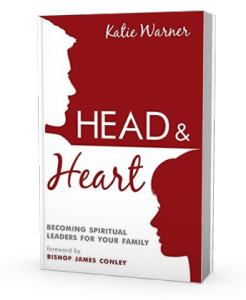 In Katie Warner’s first book, with a foreword by Bishop James Conley of Lincoln, Neb., she provides men and women with approachable catechesis, practical strategies, inspiring stories, and excellent resources to integrate the Catholic faith more intentionally into family life. The book was written for individual use at home or for use in dioceses and parishes, marriage ministries and marriage preparation, adult faith formation, men’s and women’s groups and book studies, and for supplemental formation of parents whose children are in Catholic schools.
In Katie Warner’s first book, with a foreword by Bishop James Conley of Lincoln, Neb., she provides men and women with approachable catechesis, practical strategies, inspiring stories, and excellent resources to integrate the Catholic faith more intentionally into family life. The book was written for individual use at home or for use in dioceses and parishes, marriage ministries and marriage preparation, adult faith formation, men’s and women’s groups and book studies, and for supplemental formation of parents whose children are in Catholic schools.
The home is truly the epicenter of evangelization, and if more families were focused on the characteristics of strong spiritual leadership that are outlined in this book, we would experience a lot fewer Catholics leaving the Church and a major resurgence of energy in our parishes and throughout the entire Church.
Head & Heart has received endorsements from Dr. Scott Hahn, Jeff Cavins, Dr. Edward Sri, Bishop Thomas Olmsted, Bishop Sam Jacobs, Patrick Coffin, Steve Ray, and a number of other lay Catholic evangelists, priests and bishops. Make sure this book is in your home and at your parish. With this resource, men and women can learn how to become the spiritual “heads and hearts” that God created them to be.
I’m using Rafflecopter to help with the giveaway, which is cool because it allows you multiple entries for commenting, posting on Facebook, sharing on Twitter, etc. Click below to enter:
(If you’re reading this through email or RSS and don’t see the giveaway widget, click here.)
By entering this giveaway you agree to occasionally receive email updates from me—no spam, just updates about free books, cool links, and exciting news.
The winner(s) will be randomly selected next Friday and the books will be sent out, free of charge, shortly thereafter.
In the future I’ll be giving away more books and resources, sometimes multiple items per giveaway! So subscribe via feed reader or email to ensure you never miss your chance to win.
(Since I’m covering the shipping costs, only residents within the continental United States are eligible to win.)
The post Book Giveaway (10 copies): “Head & Heart” appeared first on Brandon Vogt.





August 28, 2015
Book Giveaway (10 copies): “Casting Nets: Grow Your Faith by Sharing Your Faith”
“Find out how much God has given you and from it take what you need; the remainder is needed by others.” – St. Augustine
Since I’ve built up a large collection of extra books and resources, every week I give some away absolutely free, no strings attached. Each giveaway lasts seven days with a new one beginning every Friday. You can enter any time during the week. Check out my past giveaways here.
Thanks to Our Sunday Visitor, today I’m giving away TEN copies of Chris Stewart and Tony Brandt’s new book, Casting Nets: Grow Your Faith by Sharing Your Faith. Learn more and enter below!
Casting Nets: Grow Your Faith by Sharing Your Faith
by Chris Stewart and Tony Brandt
Our Sunday Visitor, 176 pages, hardcover
 “Jesus wants evangelizers who proclaim the good news not only with words, but above all by a life transfigured by God’s presence.” — Pope Francis
“Jesus wants evangelizers who proclaim the good news not only with words, but above all by a life transfigured by God’s presence.” — Pope Francis
In their travels around the country teaching individuals, parishes, and diocese to evangelize, authors Chris Stewart and Tony Brandt have discovered something amazing: when Catholics live their Faith it fills their lives so much joy so that they can’t help but share their Faith – which increases their joy!
In Casting Nets you’ll learn to “catch” people for the Lord using the seven pillars of effective evangelization, Stewart and Brandt’s tested and proven principles that allow for effective evangelization, all modeled in the life of Jesus.
Prayerful
Invitational
Hospitable
Inspirational
Sacramental
Formational
Missionful
Casting Nets is perfect for individuals or parishes searching for an effective program to share the Faith, and as a result, watch their own faith grow!
I’m using Rafflecopter to help with the giveaway, which is cool because it allows you multiple entries for commenting, posting on Facebook, sharing on Twitter, etc. Click below to enter:
(If you’re reading this through email or RSS and don’t see the giveaway widget, click here.)
By entering this giveaway you agree to occasionally receive email updates from me—no spam, just updates about free books, cool links, and exciting news.
The winner(s) will be randomly selected next Friday and the books will be sent out, free of charge, shortly thereafter.
In the future I’ll be giving away more books and resources, sometimes multiple items per giveaway! So subscribe via feed reader or email to ensure you never miss your chance to win.
(Since I’m covering the shipping costs, only residents within the continental United States are eligible to win.)
The post Book Giveaway (10 copies): “Casting Nets: Grow Your Faith by Sharing Your Faith” appeared first on Brandon Vogt.





August 27, 2015
How St. Monica Can Help Your Child Return to the Church
This article was cross-posted today at the Word on Fire blog.
You probably know the pattern. A smart and gifted boy leaves home for school. He makes new friends. They spend most of their time partying, chasing girls, and embracing new philosophies. The son becomes drawn to a trendy religious cult. Eventually, he moves in with his girlfriend and they have a child, without being married. The boy’s mother can only sit by in despair, heartbroken over his choices and helpless. The only thing she can do is pray.
That’s the story of many Catholics today – and maybe your story. Parents think they’re alone in facing these sorts of troubles, but this pattern isn’t a new one. It stretches back for centuries, and in the case above, even more than a millennium. It’s the fourth-century story of St. Monica and her young wayward son, Augustine.
Monica was raised as a Christian, but like many people today, she married someone from a different faith. In her case, the man, Patricius, was an atheist politician. They had three sons together but their marriage was rocky. Patricius was a violent man and regularly abused her. He also was unfaithful to her throughout their marriage. But Monica remained patient. Other wives with marriage problems came to her for advice and she became a source of comfort for anyone suffering through difficult marriages. She served Patricius with selfless love and devotion, and she prayer for him every day. Eventually, her prayers bore fruit. A year before Patricius died, he converted to Catholicism—due mostly to Monica’s prayers and powerful example.
Although the conversion of Monica’s husband pleased her, she still worried about her son, Augustine. Though brilliant and gifted, he spent most of his time carousing the streets with friends, stealing food, and living promiscuously. He even fathered a son out of wedlock. Yet Monica refused to give up on her son, just as she committed to her husband. She prayed daily and intensely for Augustine, fasted for his sake, and begged God to help him return to faith. When Augustine traveled to Rome and Milan for his education, Monica followed him and continued praying.
While in Milan, she met Ambrose, the local bishop who would later be canonized a saint. Ambrose became a spiritual guide to her. He noted her restless longing for her son and the hours she spent praying for him. He promised her, “Surely the son of so many tears will not perish.” His prediction would eventually prove correct.
Augustine and Ambrose struck up a friendship and began discussions about Christianity. Ambrose was the first high-level Christian thinker Augustine had met. As a result of their many back-and-forth dialogues, Augustine finally decided to convert to Catholicism. Ambrose baptized the 32-year-old Augustine, who would eventually grow into one of the most influential thinkers in Western history, and one of the greatest saints in the Catholic Church.
Monica could hardly contain her enthusiasm after Augustine’s baptism. She and her son began sharing beautiful conversations about God and heaven. As she lay on her deathbed, content at having seen both her husband and her son come back to the faith, she felt her whole life’s mission had been accomplished. Today, the Church celebrates St. Monica and St. Augustine right next to each other in the liturgical calendar, with her feast day on August 27 and his on August 28.
St. Monica exemplifies the power of a praying parent. She wasn’t able to convince Augustine with words, and in fact, whenever she tried to talk to him about religion, he brushed her away. But through her daily, committed intercession, over more than fifteen years, Augustine was able to journey into the Church.
What can we learn from Monica’s example? First, don’t stop praying for your child. When Monica complained that Augustine would not listen to her admonitions that he become a Catholic, Ambrose urged her, “Speak less to Augustine about God and more to God about Augustine.” She took his advice and never gave up, even when things looked dark. Eventually, her persistence paid off.
Jesus tells of a widow who was upset that a judge refused to hear her case. The widow kept coming to the judge with her request, over and over, until he finally relented, saying, “While it is true that I neither fear God nor respect any human being, because this widow keeps bothering me I shall deliver a just decision for her lest she finally come and strike me.” Jesus explained the parable, saying, “Pay attention to what the dishonest judge says. Will not God then secure the rights of his chosen ones who call out to him day and night? Will he be slow to answer them?” (Lk 18:1-8). In other words, God loves persistent prayer. He never tires of your requests, even if you bring the same needs to him every day.
Joan Hamill knows that from experience. Joan prayed weekly for 15 years for different family members to return to the Church. “I prayed for St. Monica to intercede for our family members,” says Hamill. “As a result I had two brothers come back to the Church as well as my sister and brother-in-law.”
So don’t give up praying for your child. Like St. Monica and the persistent widow, have confidence that God will reward your perseverance. The more resilient your prayer, the more likely God will answer it.
The second thing to learn from St. Monica is not to just pray for your child—you should also pray for an “Ambrose” to step into your child’s life. Perhaps there is just too much baggage between you and your child so that he will no longer hear truth from your lips. That’s understandable. Pray that God will bring someone else into his path, someone with just the right combination of personality, interests, motives, and heart. Just as Ambrose stepped in to help Augustine, so you might need someone to nudge your child along.
(Also, keep in mind that while you’re praying for someone to step into your child’s life, other parents are praying the same thing for theirchild. And you may be that person! Even if your child tunes you out, don’t be closed off to helping other children return to faith. You could be the Ambrose for someone else’s Augustine!)
The third takeaway is that you can ask St. Monica’s intercession for your child. A recent survey asked Catholic parents, “When you pray, how often do you pray to or ask the intercession of…” and then listed several options. By far, the most common responses were “God the Father” (74% prayed to him always or most of the time), “God the Son, Jesus Christ” (59%), and “God the Holy Spirit” (45%). But you know what the least common response was? The saints. Only one-in-five Catholic parents regularly asked the saints’ intercession. That means the most Catholic parents are missing out on some of the greatest spiritual support available to us.
For Catholics, the saints are not dead and gone. St. Monica didn’t cease to exist when she died in 387. Her body may have stopped functioning when her soul departed, but she remains alive in Christ, residing with him in heaven for all eternity. And because the Church is one, indivisible body (1 Cor 12:12), which neither death nor life can break apart (Rom 8:38), we can still connect with those holy men and women who have already passed into the next life and ask for their prayers.
Among all the saints in heaven, few know the gut-wrenching pain of a wayward child more than St. Monica. Reach out to her and ask her to pray for your child, just as she did for Augustine. We regularly ask our friends on earth to pray for us, and we can do the same with the saints. In fact, the saints’ prayers are generally more powerful than ours here on earth since they are closer to the mind and heart of God—the saints are already in heaven! So next time you pray, offer a short request to St. Monica such as this:
“St. Monica, I need your prayers. You know exactly how I’m feeling because you once felt it yourself. I’m hurting, hopeless, and in despair. I desperately want my child to return to Christ in his Church but I can’t do it alone. I need God’s help. Please join me in begging the Lord’s powerful grace to flow into my child’s life. Ask the Lord Jesus to soften his heart, prepare a path for his conversion, and activate the Holy Spirit in his life. Amen.”
In all these ways, St. Monica offers not only example but help in drawing our children back to the Church.
This is excerpted from my forthcoming video series on drawing your child back to the Church. To find out when it’s available, click here.
The post How St. Monica Can Help Your Child Return to the Church appeared first on Brandon Vogt.





August 14, 2015
Book Giveaway (10 copies): “Rediscover Jesus” by Matthew Kelly
“Find out how much God has given you and from it take what you need; the remainder is needed by others.” – St. Augustine
Since I’ve built up a large collection of extra books and resources, every week I give some away absolutely free, no strings attached. Each giveaway lasts seven days with a new one beginning every Friday. You can enter any time during the week. Check out my past giveaways here.
Thanks to Dynamic Catholic, today I’m giving away TEN copies of Matthew Kelly’s new book, Rediscover Jesus: An Invitation. Learn more and enter below!
Rediscover Jesus: An Invitation
by Matthew Kelly
Dynamic Catholic, 183 pages, hardcover
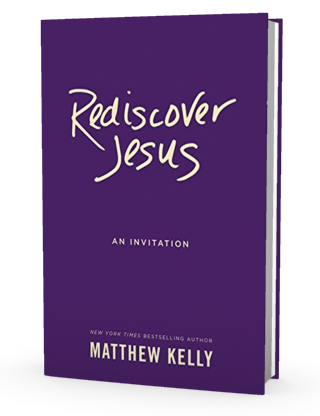 At a time when so many people are spiritually disillusioned and searching for ways to live, love, work, and play that nurture the soul rather than destroy it, Matthew Kelly once again delivers a powerful book that encourages us in our weariness, challenges us in our comfort, and invites us to rediscover the beautiful possibilities God places before us daily.
At a time when so many people are spiritually disillusioned and searching for ways to live, love, work, and play that nurture the soul rather than destroy it, Matthew Kelly once again delivers a powerful book that encourages us in our weariness, challenges us in our comfort, and invites us to rediscover the beautiful possibilities God places before us daily.
Rediscover Jesus is a profound invitation to seek deeply personal answers to our deeply personal questions. Each page seems to effortlessly reach into every aspect our lives, providing spiritual wisdom and practical insights that help us to know both Jesus and ourselves in a new way.
Some books find us at just the right time, and those books change our lives forever. Rediscover Jesus is one of those books.
How well do you know Jesus?
I think about this often, and I always come to the same realization. I don’t know Jesus anywhere near as well as I would like to know him. The desire is there, but life gets in the way. There are times when I seem to be making great progress, and other times when I wonder if I know him at all.
But I always arrive back at the same inspiring and haunting idea: If there is one person that we should each get to know in a deeply personal way, it is Jesus the carpenter from Nazareth, the itinerant preacher, the Son of God, the King of Kings and the Lord of Lords, the Lamb of God, the new Adam, the Messiah, the Alpha and the Omega, the Chosen One, the Light of the World, the God-Man who wants good things for us more than we want them for ourselves, the healer of our souls.
I’m using Rafflecopter to help with the giveaway, which is cool because it allows you multiple entries for commenting, posting on Facebook, sharing on Twitter, etc. Click below to enter:
(If you’re reading this through email or RSS and don’t see the giveaway widget, click here.)
By entering this giveaway you agree to occasionally receive email updates from me—no spam, just updates about free books, cool links, and exciting news.
The winner(s) will be randomly selected next Friday and the books will be sent out, free of charge, shortly thereafter.
In the future I’ll be giving away more books and resources, sometimes multiple items per giveaway! So subscribe via feed reader or email to ensure you never miss your chance to win.
(Since I’m covering the shipping costs, only residents within the continental United States are eligible to win.)
The post Book Giveaway (10 copies): “Rediscover Jesus” by Matthew Kelly appeared first on Brandon Vogt.





August 10, 2015
Rediscover Jesus: An Interview with Matthew Kelly
Every generation produces a handful of game changing leaders in the Church, and Matthew Kelly is certainly one of ours. Matthew was born in Sydney, Australia—hence his enviable accent which makes anything he says sound brilliant—and he began speaking and writing in his late teens while he was attending business school. Since then, he’s become one of the most successful business and motivational speakers in the world.
Matthew runs a Chicago-based management-consulting firm named Floyd Consulting and his clients include Procter and Gamble, Chick-fil-A, General Electric, Pepsi, FedEx, HSBC, the Department of Defense, McDonalds, US Bank, 3M, Ernst & Young, the U.S. Navy, the U.S. Air Force, and dozens of other Fortune 500 companies.
Among Catholics, though, Matthew is best known for his powerful speaking, his Dynamic Catholic ministry, and his bestselling books. More than four million people have attended his seminars and presentations in more than fifty countries.In 2009, Matthew founded Dynamic Catholic to “re-energize the Catholic Church in America by developing world-class resources that inspire people to rediscover the genius of Catholicism.” The ministry has done that through mega-best-selling books like Rediscover Catholicism and The Four Signs of a Dynamic Catholic, which parishes can purchase for $2-$3 apiece and pass out at Easter and Christmas. Matthew’s books have been published in twenty-five languages, have appeared on the New York Times, Wall Street Journal, and USA Today bestseller lists, and have sold over fifteen million copies.
Next week, Matthew will release his newest book titled Rediscover Jesus: An Invitation. Designed as the follow-up to Rediscover Catholicism, the book takes readers on a 40-day journey from knowing about Jesus to knowing him personally and intimately.
Here’s Matthew briefly introducing the book:
If you can’t see this video in your RSS reader or email, then click here.
Today, as part of the #RediscoverJesus blog tour, I’m excited to sit down and Matthew and discuss the new book, the importance of developing a personal relationship with Jesus, and future plans for Dynamic Catholic. Enjoy!
BRANDON VOGT: The mission or your organization, Dynamic Catholic, is to “re-energize the Catholic Church in America” and inspire people to “rediscover the genius of Catholicism.” How does Rediscover Jesus fit into that mission?
MATTHEW KELLY: When we set out to explore the difference between highly engaged Catholics and disengaged Catholics, we discovered that the central difference was that highly engaged Catholics have a daily routine of prayer. If we don’t teach people how to pray, nothing will change. To energize Catholics we must engage them, and that means teaching them to develop a daily routine of prayer—helping them develop a life-changing friendship with Jesus.
 BRANDON VOGT: Rediscover Jesus is the sequel to Rediscover Catholicism, which has sold more than seven million copies and is the bestselling Catholic book in American history, other than the Bible. How do the two books tie together? Which would you give to a fallen-away Catholic first?
BRANDON VOGT: Rediscover Jesus is the sequel to Rediscover Catholicism, which has sold more than seven million copies and is the bestselling Catholic book in American history, other than the Bible. How do the two books tie together? Which would you give to a fallen-away Catholic first?
MATTHEW KELLY: Rediscover Catholicism focused on the genius of Catholicism, and Catholic spirituality in general. Rediscover Jesus is about taking a fresh look at the life and teachings of Jesus Christ, taking an inventory of our lives side by side with the Gospel, and embracing the challenge to grow. Choosing the right book to give to some is an art that I think requires a real sense of what a particular person is struggling with. I think both of these books will meet people where they are and lead them to where God is calling them to be.
BRANDON VOGT: Your new book includes 40 short, devotional entries instead of long narrative chapters. Why that format, with the “40-day journey”?
MATTHEW KELLY: When I was young I wanted to write books that people would want to read. Now I want to write books that people will live. When I write I am constantly trying to find ways to personalize it for the reader, so that the ideas can come to life in a person’s life. The Church understands that our lives change when our habits change, and forty days is the perfect time to form new habits.
BRANDON VOGT: The New Evangelization seems predicated on “re-“. Recent Popes have encouraged us to re-propose, re-tell, remind, and–per your book–help people rediscover the radiance of Christ. But that “re-” presumes people have already had some contact with Jesus, if perhaps long ago or superficially. Why do you think people need to “rediscover” Jesus? Which distorted views of him need to be healed?
MATTHEW KELLY: When I come back from a trip, however long or short, I get the joy of rediscovering my wife and children. It is a beautiful thing to rediscover people and places. In the same way it is a joy to rediscover the true Jesus and his true message.
Sometimes it is distorted views of Jesus that need to be healed, and sometimes we need to confront distorted views of ourselves. One of the essential problems of Christianity at this moment in history is that most people think they are pretty good Christians—even non-Christians. But compared to what? We find comparisons to comfort ourselves, but when we measure our lives against the Gospel we are challenged to change.
BRANDON VOGT: Some Catholics are uncomfortable with the idea of pursuing a “personal relationship with Jesus” or “knowing Jesus in a real and personal way.” They think it sounds “too Protestant”. Is that true?
MATTHEW KELLY: That’s like saying Coke isn’t the original cola. Long before a single Protestant even existed, the saints had dynamic personal relationships with Jesus. I think deep down we all long for it. I think many are uncomfortable with it because they know they don’t have it, and more importantly, they don’t know how to get it. It is my hope that Rediscover Jesus will help many to develop it.
BRANDON VOGT: In the book, you emphasize the difference between knowing about Jesus and knowing Jesus. How do we make this transition? How do we truly encounter Jesus?
MATTHEW KELLY: In ancient times, if you were a student you had a particular teacher, and you sat at his feet for many hours each day, learning. A disciple of Jesus needs to sit at his feet for at least a few minutes each day, to learn and be encouraged, to take instruction, and be given instruction for the day. We encounter Jesus in many ways, but the daily encounter in prayer is indispensible if we are to make progress spiritually.
BRANDON VOGT: Even while only available for pre-order, Rediscover Jesus soared up the bestseller lists, which means lots of people are buying it for themselves and friends. But what’s the larger plan for the book? Will it be part of the Dynamic Catholic Book Program? How can pastors order copies for their whole parish?
MATTHEW KELLY: Yes, the hardcover will be released on August 17, and I don’t know why, but I am always surprised when a book hits all the bestseller lists. And yes, it will be available in the Dynamic Catholic Book Program this Christmas, so we hope many parishes will give a copy to parishioners and visitors at Christmas Mass. Christmas is our best chance to re-engage disengaged Catholics each year.
This post is a part of the #RediscoverJesus blog tour hosted by Dynamic Catholic. You can pre-order your copy of Rediscover Jesus on either Amazon.com. Readers who pre-order the book by August 16, 2015, have a chance to win one of several prizes, including an all-expenses-paid trip to Italy with Matthew and those going on the Dynamic Catholic Pilgrimage to Rome this November.
To learn more about this sweepstakes, visit DynamicCatholic.com/RediscoverJesus/entry. Anyone who pre-orders the book will also have access to an exclusive webinar with Matthew, during which he will talk about his writing process, why he decided to write Rediscover Jesus, and why he thinks this is the most important book he has ever written.
Thank you for participating in the ! To read tomorrow’s stop on the #RediscoverJesus blog tour, please visit my friend Kathy Schiffer at Seasons of Grace.
The post Rediscover Jesus: An Interview with Matthew Kelly appeared first on Brandon Vogt.





August 9, 2015
Learning from a Heroic Convert and Martyr
Today we continue our regular series called “Learning from the Saints.” Our guide is expert Bert Ghezzi, a dear friend of mine and the author of numerous books including Voices of the Saints, Saints at Heart, and Discover Christ: Developing a Personal Relationship with Jesus.
His more recent books are The Power of Daily Mass and The Heart of Catholicism. You can learn more about Bert and his work at BertGhezzi.com.
Today, Bert profiles St. Teresa Benedicta, also known as Edith Stein, the patroness of Europe, loss of parents, Jewish converts, and martyrs.
On July 20, 1942, the Dutch hierarchy condemned the Nazis for deporting Jews to concentration camps. The Nazis quickly sought revenge by sending Jewish Catholics from the Netherlands to certain death. Among the victims was Edith Stein, a Carmelite nun, who was gassed and her body burned in the ovens at Auschwitz in August, 1942.
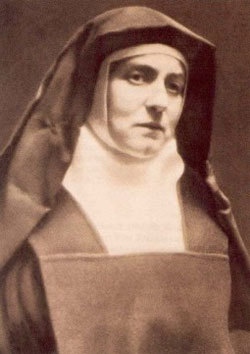 Edith Stein was a high-powered professional. Yet she never hid behind self-important pretenses. All who met this lovely woman instantly felt she had been their lifelong friend. If you had visited her, she would have served you and joked with you. You would never have guessed she was a famous scholar.
Edith Stein was a high-powered professional. Yet she never hid behind self-important pretenses. All who met this lovely woman instantly felt she had been their lifelong friend. If you had visited her, she would have served you and joked with you. You would never have guessed she was a famous scholar.
In 1916, Edith completed a Ph.D. in philosophy at Freiburg University, where she became an assistant to the renowned philosopher, Edmund Husserl. Over the next decade her writing and speaking established her reputation throughout Europe.
Edith had been raised in a devout Jewish family, but abandoned her faith in her youth. As a student, however, Edith had discovered Catholicism. She became a convert in 1921 after reading Teresa of Avila’s Autobiography.
In 1932 she was appointed lecturer at the Educational Institute in Muenster. But when the Nazis came to power a year later, she was released because she was a Jew. Edith viewed her dismissal as an opportunity to act on a longstanding desire to become a nun and she entered the Carmelite community at Cologne, taking the name Sister Teresa Benedicta of the Cross.
Edith realized that the Nazi menace would ultimately touch her. For her protection, the Carmelites moved her to a house at Echt in the Netherlands. Edith, threatened but courageous, remained confident in God, as she explained in this letter:
“It is good to remember, these days, that poverty implies being ready to leave our home in our dear convent. We have bound ourselves to the enclosure, but God has not bound himself to protect me in the enclosure-walls forever. He does not need to, because he has other walls with which to protect us.
“The situation is parallel to the use of the sacraments; for these are the pre-ordained means of grace, and we can scarcely be too eager to receive them. But God is not restricted by them. At the moment in which we are cut off from the sacraments by external power, he can more than compensate us in some other way; and he will do so the more surely the more faithfully we have gone to the sacraments beforehand.
“Similarly it is our solemn duty to observe the precepts of the enclosure as conscientiously as possible so as to live undisturbed, hidden with Christ in God. If we have done so faithfully, and if we are driven out onto the street, then our Lord will sends his angels to encircle us, and their invisible wings will enfold us in a peace more secure than that of the highest and most solid convent walls. Certainly we ought to pray that we shall be spared the experience, but only with the deeply sincere addition: ‘Not mine, but thy will be done.’”
Just as the Carmelites were arranging Edith’s relocation to a Swiss convent, the Nazis struck. On August 2, 1942, SS men seized her with other Jewish Catholics as a reprisal for the bishops’ public defiance. Edith Stein was executed at Auschwitz a week later.
We don’t easily fathom why God does not seem to protect good people from the violence of evil people. Mysteriously, he seems to have a preference for martyrdom. As the psalm says, “Precious in the sight of the Lord is the death of his saints” (116:15 RSV).
(Image Credit: Catholic.org)
Read more from Bert at his website www.BertGhezzi.com, or check out his many books on Amazon.
The post Learning from a Heroic Convert and Martyr appeared first on Brandon Vogt.





August 7, 2015
Book Giveaway (5 copies): “Not Just Good, but Beautiful”
“Find out how much God has given you and from it take what you need; the remainder is needed by others.” – St. Augustine
Since I’ve built up a large collection of extra books and resources, every week I give some away absolutely free, no strings attached. Each giveaway lasts seven days with a new one beginning every Friday. You can enter any time during the week. Check out my past giveaways here.
Thanks to Plough Publishing, today I’m giving away FIVE copies of a new book which includes talks on marriage by Pope Francis, Rick Warren, N.T. Wright, and teachers and leaders from several different major religions. It’s titled Not Just Good, but Beautiful: The Complementary Relationship between Man and Woman and it’s based on the extraordinary Humanum conference.
Also, here’s some great news! Thanks to the generosity of the publisher, even if you don’t win the giveaway, everyone who enters here will receive a 50% discount on the book after the drawing—it’s a no-brainer to enter. Learn more and enter below!
Not Just Good, but Beautiful: The Complementary Relationship between Man and Woman
by Pope Francis and Others
Plough Publishing House, 164 pages, paperback
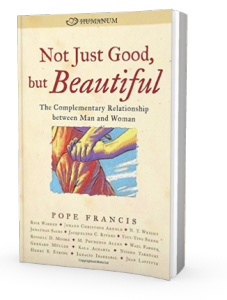 In an unprecedented interreligious conference in November 2014, Pope Francis and four hundred religious leaders and scholars from around the world met in Rome to explore what their diverse faiths teach about marriage and “the complementarity of man and woman.”
In an unprecedented interreligious conference in November 2014, Pope Francis and four hundred religious leaders and scholars from around the world met in Rome to explore what their diverse faiths teach about marriage and “the complementarity of man and woman.”
This book contains the most representative presentations at that closely followed event, Humanum: An International Interreligious Colloquium, which included Catholic, Evangelical, Anglican, Pentecostal, Eastern Orthodox, Anabaptist, Mormon, Jewish, Muslim, Jain, Buddhist, and Hindu delegates. Contributors bring the wisdom of their various faiths and cultures to bear on this timely issue, examining, celebrating, and illustrating the natural union of man and woman in marriage as a universal cornerstone of healthy families, communities and societies.
With broad global representation, Not Just Good, but Beautiful uses fresh language and images to highlight the beauty and benefits of marriage. Contributors do not represent political parties, but speak from their religious, intellectual, and cultural knowledge and experiences.
I’m using Rafflecopter to help with the giveaway, which is cool because it allows you multiple entries for commenting, posting on Facebook, sharing on Twitter, etc. Click below to enter:
(If you’re reading this through email or RSS and don’t see the giveaway widget, click here.)
By entering this giveaway you agree to occasionally receive email updates from me—no spam, just updates about free books, cool links, and exciting news.
The winner(s) will be randomly selected next Friday and the books will be sent out, free of charge, shortly thereafter.
In the future I’ll be giving away more books and resources, sometimes multiple items per giveaway! So subscribe via feed reader or email to ensure you never miss your chance to win.
(Since I’m covering the shipping costs, only residents within the continental United States are eligible to win.)
The post Book Giveaway (5 copies): “Not Just Good, but Beautiful” appeared first on Brandon Vogt.





Brandon Vogt's Blog
- Brandon Vogt's profile
- 75 followers


